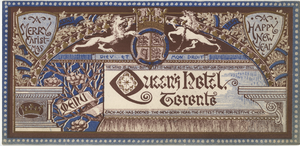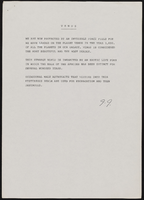Search the Special Collections and Archives Portal
Search Results
Su Kim Chung oral history interview
Identifier
Abstract
Oral history interview with Su Kim Chung conducted by Claytee White on March 11, 2021 for the Boyer Early Las Vegas Oral History Project.
Su Kim Chung is the Public Services Department Head of University of Nevada, Las Vegas Lied Library's Special Collections and Archives. This interview was conducted in part for the 20th year celebration of Lied Library. Su Kim first talks about the construction of Lied Library and what makes it special compared to the previous library building on campus. She then discusses her personal history and education that led her to UNLV, where she has now worked for 22 years. Her work involves manuscript curation, panel discussions with Las Vegas entertainers, and oral history collection among other activities. She has also written a book, Las Vegas Then and Now, that talks of the city's rich entertainment history.
Archival Collection
Claytee D. White oral history interview
Identifier
Abstract
Oral history interview with Claytee D. White conducted by Stefani Evans on November 2, 2023 for the African Americans in Las Vegas: a Collaborative Oral History Project. In this interview, Claytee D. White, founding directory of the Oral History Research Center at UNLV Libraries, celebrates the twentieth anniversary of the OHRC by contributing her oral history to the collection.
She begins by explaining how the system of sharecropping worked in her family near rural Ahoskie, North Carolina, and she talks about the field work involved in raising cotton, tobacco, corn, and peanuts. The fifth of eight children and the first daughter, she shares memories of going into town with her mother, of admiring her women teachers, and of attending North Carolina Central College (now University) for two years before moving to Washington, D.C., and working for the telephone company.
After recalling her two years in D.C. and 22 years in Los Angeles, California, she describes "running away" to Las Vegas, Nevada in the early 1990s. Here, at the History department at UNLV, she recalls learning to conduct oral histories. White shares memories of her first interviews with Hazel and Jimmy Gay and Lucille Bryant. She talks of matriculating to the College of William and Mary for her PhD and of returning to Bertie County to live with her mother and administer the office of The Shaw University Center for Alternative Programs in Education (CAPE). She describes how she was offered the position of OHRC founding director, why it matters that she was an "opportunity hire," and how it feels to be the only Black person in a room.
Archival Collection
Series II: Personal, 1907-1957
Level of Description
Scope and Contents
The personal series consists of journals, correspondence and family mementos including three scrapbooks. Though some of the journals and diaries do record personal feelings and thoughts, for the most part they are comments on daily activities. Three journals represent the years Denton served as an Assemblywoman for the Nevada State Legislature. Also included is family biographical information.
Archival Collection
Collection Name: Hazel Baker Denton Papers
Box/Folder: N/A
Archival Component

Fountainbleau Las Vegas at Sunrise, Las Vegas, Nevada: digital photograph
Date
Archival Collection
Description
Image

Fountainbleau Las Vegas at Sunrise, Las Vegas, Nevada: digital photograph
Date
Archival Collection
Description
Image

Fountainbleau Las Vegas at Sunrise, Las Vegas, Nevada: digital photograph
Date
Archival Collection
Description
Image

Photograph of Native American elder, Pahrump (Nev.), December 1959
Date
Archival Collection
Description
Image

Transcript of interview with Wilma and Burt Bass by Barbara Tabach, February 9 , 2015
Date
Archival Collection
Description
In 1939, Wilma (Frank) Bass was born in New York City, where she began her involvement in theater at the age of ten. Almost twenty years later, she met Burt Bass (1932- ) when both worked for a photography studio, one of Burt first post-high school jobs. Burt opened his first professional photography studio in 1962, shortly after he married Wilma in 1960. The couple soon had two daughters – Jill and Wendy – and moved to Las Vegas in 1974. Burt initially worked for his brother-in-law Ed Frank's check cashing businesses and later opened his own photography business, Burton Studio. He later added services such as fingerprinting, background checks, and photographs for identification cards. Wilma worked as a jewelry salesperson, first at the Gold Factory then at Nieman Marcus. Socially, she was very involved with Temple Beth Sholom’s Sisterhood, using her theater talents to write, direct and produce various shows for the Sisterhood, ORT as well as B’nai B’rith Youth Organization. In this interview, Burt discusses his photography business, the migration of its storefront around town, and his colorful landlords, including individuals like Moe Dalitz and Art Marshall. Wilma talks about her sales career in the local jewelry industry, and more extensively, she shares memories of her involvement in the Jewish community with theater productions. Much of the discussion revolved around related news articles and personal photos from their relationships and activities within the Jewish community. The couple also shares stories of friendships with local entertainers, including Jerry Lewis and Neil Sedaka.
Text


